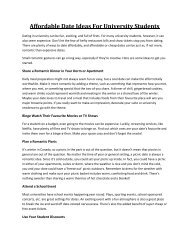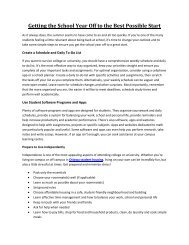A Quick Guide To Moving To University
Here is a quick guide to help you make the transition to university living a bit easier.
Here is a quick guide to help you make the transition to university living a bit easier.
Create successful ePaper yourself
Turn your PDF publications into a flip-book with our unique Google optimized e-Paper software.
A <strong>Quick</strong> <strong>Guide</strong> <strong>To</strong> <strong>Moving</strong> <strong>To</strong> <strong>University</strong><br />
<strong>Moving</strong> to university is a major step in many young people’s lives. There are a lot of steps involved<br />
in the moving process, which can quickly overwhelm first-time university students, but with a bit of<br />
guidance, this process can become faster, easier and more efficient. Below is a quick guide to<br />
moving to university with as few hiccups as possible.<br />
Pack Like a Pro<br />
Packing is perhaps the most important and arduous part of moving. It requires planning, patience<br />
and organization. Without these things, the process may become time-consuming and stressful. But<br />
there are some tips and tricks that could help you pack like a professional. For example:<br />
<br />
<br />
<br />
<br />
<br />
<br />
<br />
<br />
<br />
<br />
<br />
<br />
Start packing at least two weeks in advance<br />
Create and follow a ‘packing to-do list’ and schedule<br />
Scratch things off your to-do list as you complete them<br />
Get packing materials<br />
Throw away or donate unwanted items first<br />
Pack the most difficult items and non-essentials (things you don’t use every day or often) before<br />
anything else<br />
Some items may be provided by the university or your residence, so only pack the essentials<br />
Obtain a list of the items provided, as well as a list of things you should bring<br />
Ask friends and/or family to help you with your move<br />
Secure a moving van or a car to move your belongings<br />
Clean your space and separate your belongings into categories that include 'throw away,' 'leave<br />
behind,' 'take,' 'donate,' etc.<br />
Label your boxes, don’t overstuff them, use appropriate packing materials (i.e. bubble wrap,<br />
packing tape, etc.), especially for fragile items or electronics and pack heavy items on the<br />
bottom of boxes<br />
Secure Housing<br />
Finding housing is really the first step in the moving process. It is, of course, also the most important<br />
step. But first decide if you want to live in a residence hall or in off-campus student housing. For a<br />
comfortable transition into your new housing, look for places that include the following amenities:<br />
<br />
<br />
<br />
A quiet study space, e.g. the library, study lounge or a quiet room<br />
Proximity to your campus and/or transit<br />
Space for fun and relaxation, such as a games lounge, fitness centre, movie theatre, etc., as well<br />
as quick access to neighbourhood amenities
A kitchen area or cooking space<br />
On-site laundry and parking<br />
Storage<br />
Reliable Wi-fi<br />
A workspace for homework and studying<br />
Security and safety equipment and procedures<br />
24-hour maintenance<br />
Besides offering student-friendly conveniences, your housing should also be stable, in a safe<br />
neighbourhood and secured at least two months before the first semester begins. This will give you<br />
time to become familiar and comfortable with the housing facility, neighbourhood and your<br />
roommates (if applicable).<br />
Introduce Yourself on Social Media<br />
Social media can introduce you to your university and peers before the school year even begins. It<br />
can also offer vital information for navigating the campus, your courses, residence hall and more.<br />
Basically, information found on your university’s social media pages can act as a survival guide for<br />
your freshman year. Not to mention, social media provides a unique opportunity to connect with<br />
your peers, professors and student advisor. In fact, you should connect with your advisor before<br />
starting university. An advisor can offer advice on every aspect of university life, including choosing<br />
courses, joining student activities, finding a job or housing, making friends and so much more. You<br />
can also find ample help and information on campus events at your university’s student union<br />
Facebook page or social media groups.

















